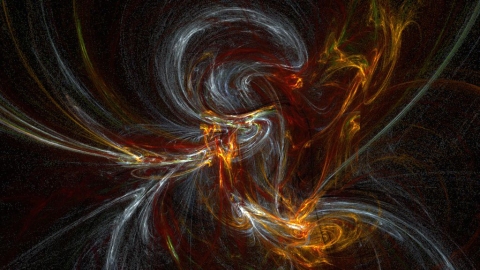Science is built on a foundation of observable facts and testable truths. But I recently heard a prominent young physicist utter perhaps the greatest false premise in science when he said: “The story of our solar system is the story of the creation of order out of chaos.”
 The idea that the universe and galaxies, solar systems and life begin in disorder and move toward order is logically nonsensical. How can order arise from disorder? There has to be order to begin with to end up with order.
The idea that the universe and galaxies, solar systems and life begin in disorder and move toward order is logically nonsensical. How can order arise from disorder? There has to be order to begin with to end up with order.
Of course there’s no ‘ending up’ with anything; there’s just the creative unfolding of the cosmos, including life on earth.
But the idea of ‘order out of disorder’ has deep roots in Western civilization, going back at least as far as Genesis. “And the earth was without form, and void; and darkness was upon the face of the deep.”
The confusion begins there, by conflating formlessness and form with disorder and order. Initially, the early universe had no form, then barely a form, and finally the form of galaxies and solar systems as we know them.
Interestingly, astronomers believe that small variations in space/time/energy after the Big Bang led to huge gravitational coalescences that produced supermassive black holes, which equal billions of solar masses in many cases. These supermassive black holes (which are believed to lie at the center of all galaxies, either active or inactive) in turn acted as immense engines of galactic formation in the early universe, eventually producing the first stars.
In considering the history of galactic and star formation, scientists began using the phrase ‘order out of disorder,’ when they really mean to say is form out of formlessness. But that sounded too theological. So the idea of order out of disorder, which is actually deeply anthropocentric, stuck, and even the most sophisticated physicists habitually refer to it as a given. It isn’t a given at all however.
The problem of how order could arise out of disorder is ignored, but then so too is the problem of how complexity arises from simplicity. I would argue that the two are fundamentally different however. Science can account for increasing complexity to a large degree. It’s called evolution, stellar or terrestrial.
There is a directionality of complexity. Galaxies, stars and life go from simpler to more complex. That even applies to the basic stuff of the universe, the elements. Stars incomprehensibly larger than our sun produced elements when they went supernova that didn’t exist in the early universe. We are comprised of those elements, such as iron for oxygen transport.
The point is that order has to exist for order to obtain. That is, order must be in the beginning to exist anywhere in the evolution of the universe, and life within it.
And if order is in the beginning of the universe, then it existed before the beginning. That turns the mechanistic, wholly random view of the universe, which most scientists hold like a theological doctrine, on its head. It does not predicate a Creator; it just means order is a constant, fully present every moment in the universe.
The real question is not, how does order grow out of disorder, but how did disorder grow out of order? That is, how did the disorder of man arise from the order of the universe and nature?
 Only man grows in disorder and darkness. (Though there are certainly other thought-bearing species elsewhere in the Milky Way, much less the universe, which have gone through or are going through the same planetary crisis humankind is at present.) But how can disorder grow out of order, if order cannot grow out of disorder?
Only man grows in disorder and darkness. (Though there are certainly other thought-bearing species elsewhere in the Milky Way, much less the universe, which have gone through or are going through the same planetary crisis humankind is at present.) But how can disorder grow out of order, if order cannot grow out of disorder?
It’s much easier to see how disorder emerged from order than how order came from disorder. Indeed, the latter is impossible, and non-observable in nature, whereas the former is a fact, and an urgently pressing reality for humankind.
Man is not a ‘mistake’ of evolution; rather, something far deeper is going on that isn’t yet generally understood. Clearly, the evolution of creatures possessing ‘higher thought’ represents a quantum leap in the universe whenever and wherever it occurs. (It’s man’s hubris to think that symbolic thought could only have evolved once, with man, because it has only evolved on earth in us. Some people believe that whales and Orcas also possess ‘higher thought,’ but that does a disservice to whales and Orcas.)
Obviously, the ability to separate and manipulate ‘things’ carries the tendency not only to give primacy to the self-made order (increasingly disorder) of the mind, but also to project the mind’s secondary order as the sole order in the universe. Though everyone knows that nature has an order beyond thought, it’s widely believed to be accidental and random—not the product of an underlying order of the cosmos.
Therefore man not only fails to perceive and live in terms of the underlying order of the universe. He also keeps generating more and more disorder in a vain attempt to correct what he sees as coming from outside himself.
Martin LeFevre

